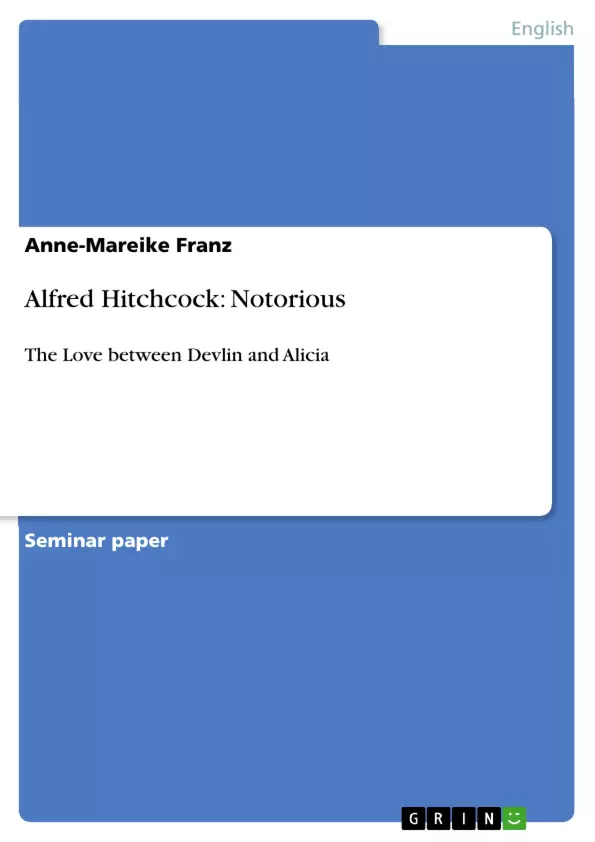In 1946 the director and “Master of Suspense” Alfred Hitchcock published a film named Notorious. The plot of this film is said to be about “a compelling spy mission interwoven with a romantic love story”. Hitchcock comments on the idea of his film as follows: “In Notorious geht es einfach um einen Mann, der verliebt ist in eine Frau, die in offiziellem Auftrag mit einem anderen Mann geschlafen hat und gezwungen wurde, ihn zu heiraten.” Concluding from his statement Hitchcock’s most important issue was to realize the love story between the two protagonists Alicia Huberman (Ingrid Bergman) and T.R. Devlin (Cary Grant). In fact the struggle of Alicia and Devlin, who are meant to be the heroic figures, is running like a central thread through the film until they are finally able to come together in the end. In the following analysis of the film Notorious from 1946 will be discussed how this struggle affects and changes both characters and their relationship to each other.
Inhaltsverzeichnis (Table of Contents)
- Introduction
- Alicia Huberman
- Alicia's Two-sided Personality - Appearances are Deceptive
- The Influence of her Father's Past
- The New Miss Huberman
- T.R. Devlin
- T.R. Devlin a Professional Spy
- Duty versus Love - Devlin and Women
- The Relationship of Alicia and Devlin - Love and Rejection
- Their First Meeting
- Alicia's Assignment as a Spy – between Job and Private Matters
- The Love Triangle Devlin - Alicia - Sebastian
- Alicia's Point of View
- Devlin's Point of View
- Sebastian's Point of View
- The Situation Collapses - The Interference of Sebastian's Mother
- The Rescue of Alicia - A Final Confirmation of Devlin's Love?
- Conclusion
Zielsetzung und Themenschwerpunkte (Objectives and Key Themes)
This paper analyzes the love story between the protagonists Alicia Huberman and T.R. Devlin in Alfred Hitchcock's 1946 film "Notorious." It examines how their relationship evolves and the struggles they face in their respective roles as a spy and a woman of questionable reputation.- The complexity of Alicia's character and her struggle to overcome her past and reconcile her two-sided personality.
- The influence of Alicia's father's past on her present life and her relationship with Devlin.
- The tension between duty and love in T.R. Devlin's life as a professional spy.
- The development of Alicia and Devlin's relationship, exploring both its romantic aspects and the challenges they encounter.
- The impact of the love triangle between Alicia, Devlin, and Sebastian on the dynamics of the film and its themes.
Zusammenfassung der Kapitel (Chapter Summaries)
The introduction provides a general overview of the film "Notorious," focusing on the central theme of the love story between Alicia and Devlin and their struggle to overcome their challenges. The second chapter delves into Alicia's character, analyzing her contradictory personality, her troubled past influenced by her father's actions, and her journey to find redemption and personal growth. The third chapter shifts focus to T.R. Devlin, examining his role as a professional spy and the internal conflict between his duty to his country and his developing feelings for Alicia. The fourth chapter explores the dynamic relationship between Alicia and Devlin. It examines their initial encounter, the challenges they face in their mission, and the evolving complexity of their feelings. The chapter also explores the influence of the love triangle, examining each character's perspective and the impact on their actions.Schlüsselwörter (Keywords)
The key themes and concepts explored in this paper include: love, espionage, redemption, character development, duality, identity, sacrifice, gender roles, patriarchal society, and the impact of past experiences on present relationships. These themes are further analyzed through the lens of the specific characters and their relationships within the film.Frequently Asked Questions
What is the central theme of Alfred Hitchcock's film "Notorious"?
The central theme is a compelling spy mission interwoven with a complex romantic love story between the protagonists Alicia Huberman and T.R. Devlin.
How does Alicia Huberman's past influence her character?
Alicia's character is heavily influenced by her father's past, leading to a two-sided personality and a struggle to find redemption and personal growth.
What internal conflict does T.R. Devlin face?
As a professional spy, Devlin faces a constant tension between his professional duty to his country and his developing romantic feelings for Alicia.
Who are the members of the love triangle in the film?
The love triangle consists of the protagonists T.R. Devlin and Alicia Huberman, along with the character Alexander Sebastian.
What role does Sebastian's mother play in the plot?
Sebastian's mother interferes when the situation collapses, adding further pressure to the characters and the mission's success.
What are the key themes explored in this analysis of "Notorious"?
Key themes include espionage, redemption, duality of identity, sacrifice, gender roles, and the impact of past experiences on relationships.
- Citation du texte
- Anne-Mareike Franz (Auteur), 2005, Alfred Hitchcock: Notorious, Munich, GRIN Verlag, https://www.grin.com/document/129066



